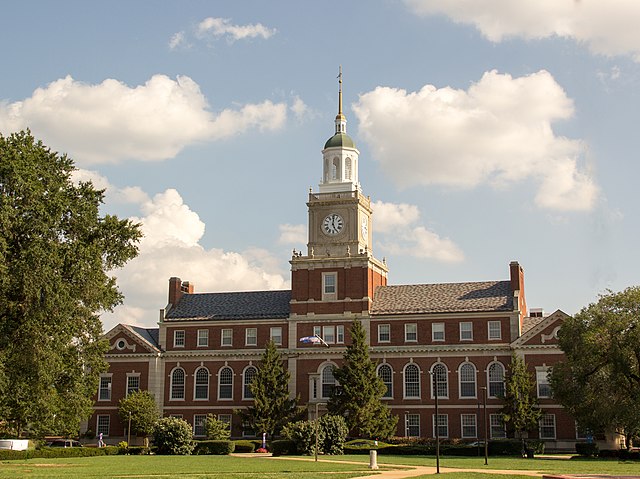
By
Fall brings college application season, and high school seniors are probably hearing the never-ending question: “Where are you applying?”
That, of course, brings up the age-old debate over what institution can best serve Black students: a PWI — Predominantly White Institution — or a HBCU — a Historically Black College or University.
There’s no one-size-fits-all answer. Instead, individual needs and aspirations, financial considerations, generational roots, or a desire to stay close to home (or move away!) play a significant role in where students apply — and where they end up.
Laniya Harris, college office coordinator at Uncommon Prep Charter High School in Brooklyn, serves as a liaison between her students and their higher education options. Part of her role is to host college admissions visits at the high school, as well as take students on campus tours in and out of state.
“I felt like when I was in college, I had more experience working with students, so I decided to come back to where I went to school,” Harris says. “I’m able to provide extra resources; I’m able to take them on small group trips.”
Harris, who gave up her own chance to go to a HBCU, attended the University of Albany. She returned to her high school to give students an opportunity to connect with the schools of their choice.
A Track Record of Success
Black high school seniors should consider how HBCUs are well-known for producing successful Black graduates. As a 2022 Proclamation on National Historically Black Colleges and Universities Week from the White House stated, “HBCUs have produced 40 percent of all Black engineers and 50 percent of all Black lawyers in America. Seventy percent of Black doctors in our country attended an HBCU, and 80 percent of Black judges are alumni of these schools.”
According to a working paper published in May by the National Bureau of Economic Research, “HBCUs punch significantly above their weight, especially considering their significant lack of resources.” The paper notes that when compared to similar schools, HBCUs have higher graduation rates for Black students than PWIs.
The paper also cites that “data from the National Survey of Black Americans found that Black students who attended a historically Black institution scored more highly on self-esteem and Black identity.”
Following the Money
“Coming to college, the biggest thing was the price,” says Destin Branch-el, a freshman at SUNY Brockport and a student-athlete pursuing a major in sports management.
Unlike the traditional college process for some students, schools were recruiting him just as much as he was looking at them.
“My college process, I was very confused,” Branch-el says. “There’s so much things you have to look at like the football team, how far is it from home, what majors they have, and do I want to study the majors?”
“I was lost because this isn’t really the environment that I’m used to,” Branch-el says. “If a HBCU did come out and contact me, I would be more comfortable going to a HBCU. But college options are limited, so I chose what was best for me.”
An opportunity to pursue his passions while receiving an affordable education was definitely a deal breaker.
“Somebody going to college — a lot of people’s goal is to not pay. I’m not going to get into specifics on how much I pay, but it’s not nearly as much as what other people pay,” he says.
Anysa Dormoy, a freshman at the University of Albany, says she gave up her Spelman College acceptance because her mom didn’t want to take on such a heavy debt.
“I’m studying to be in the medical field, so I have a lot of years in school to pay for,” Dormoy tells Word In Black. “The best option for us was to go to the school that offered me the most money for my bachelor’s, and follow up elsewhere.”
For the 2021-2022 academic year, the average total cost of attending an HBCU was $26,138 to $29,990 for on-campus students. Tuition and fees make up the majority of that cost, ranging from $11,391 for in-state students to $15,262 for out-of-state students.
Seventy-two percent of Black students take on debt as they seek their degrees, as opposed to 56% of their white peers. While the number of Black students enrolled in college has increased over the last few decades, African-American enrollment at the nation’s most elite colleges — often toting the biggest price tags — has remained mostly the same. In March 2022, the Biden Administration announced a breakdown of funding that would be awarded to HBCUs under the American Rescue Plan. Under the plan, HBCUs received more than $2.7 billion in federal funding.
What’s the Experience?
“At first I wanted to go to a school that wasn’t far, and a PWI,” Tiara Branch, 17, a freshman screenwriting and animation major at Morgan State University tells Word In Black. That changed when she began reflecting on how much she loves being around Black folks.
“I don’t think I would’ve been fully comfortable with it,” she says of attending a PWI. Plus, “Morgan has my major.”
Ultimately, a HBCU may be a great experience for some Black students to find community support as well as academic excellence, while others may prefer attending a PWI.
The bottom line? It’s a personal choice, and visiting campuses can help get a feel for the right fit.
“I originally wanted to go to a PWI because I was raised in a Black community so every school I went to it was always mainly Black people,” Branch says. But, at an HBCU, “they focus on Black people, Black film, Black experiences, and I don’t think I can get that at a PWI, especially when it comes to film.”


